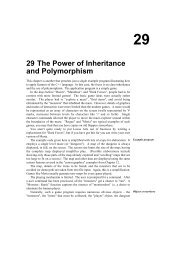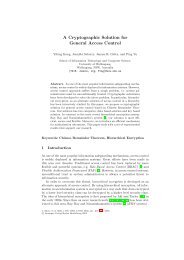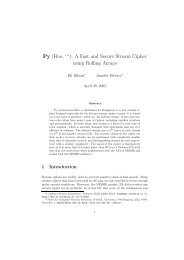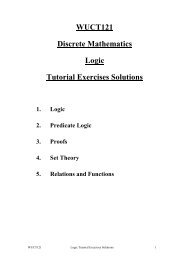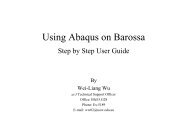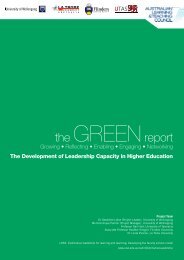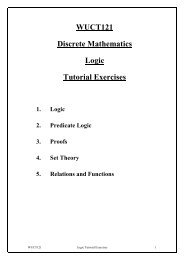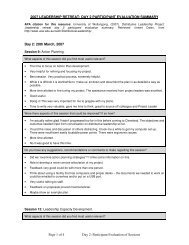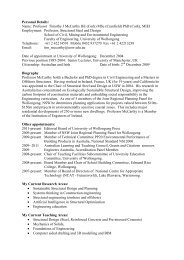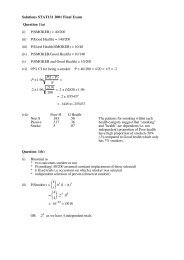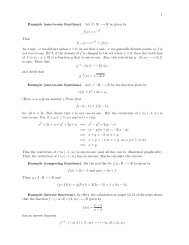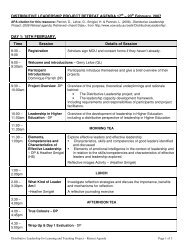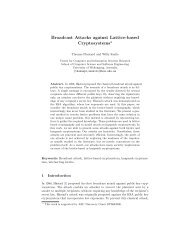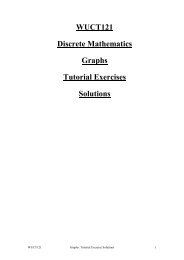india author m 1- a-nan - University of Wollongong
india author m 1- a-nan - University of Wollongong
india author m 1- a-nan - University of Wollongong
Create successful ePaper yourself
Turn your PDF publications into a flip-book with our unique Google optimized e-Paper software.
DUDT, CHARMAZEL. "Jhabvala's Fiction: The Passage From India" 159-64 in Kessler-<br />
Harris, Alice & McBrien, William., eds Faith <strong>of</strong> a (Woman) Writer Westport CT:<br />
Greenwood, 1988, ix + 350 pp.<br />
EZEKIEL, NISSIM. "Cross-Cultural Encounter in Literature" Indian PEN 43.11-12<br />
(1977):4-8.<br />
GOONERATNE, YASMINE. "'Traditional' Elements in the fiction <strong>of</strong> Kamala Markandaya,<br />
R.K. Narayan and Ruth Prawer Jhabvala" WLWE 15.1 (April 1976):121-34.<br />
GOONERATNE, YASMINE. "Irony as an Instrument <strong>of</strong> Social and Self-analysis in Ruth<br />
Prawer Jhabvala's Heat and Dust" New Literature Review 4 (1978):41-50.<br />
Focuses on narrative strategy and questions whether the intense honesty and reliability<br />
<strong>of</strong> the narrator shifts into a growing psychological imbalance causing total disintegration <strong>of</strong> the<br />
personality in the novel's final pages. Examines the narrator's character concerned with<br />
psychological investigation as an exercise in self-analysis or, in another approach,forms the<br />
basis <strong>of</strong> an archetypal quest-figure. Deems this fiction entirely psychologically relevant to the<br />
<strong>author</strong>'s own mental condition and completely unsatiric in intent. Finds "Heat and Dust" boldly<br />
self-reflexive and dominated by an ironic detachment.<br />
GOONERATNE, YASMINE. "Ruth Jhabvala: Generating Heat and Light" Kunapipi 1<br />
(1978): 115-29.<br />
Takes the Indian literary community to task for their refusal to grant Mrs. Jhabvala the<br />
serious critical treatment she deserves. The award <strong>of</strong> the Booker Prize in l975 has engendered<br />
resentment rather than opened up substantive critical assessment. Extends earlier<br />
considerations in thematic criticism by noting a deliberate change from early fiction based on<br />
social satire to a new concern with loneliness and isolation as expressed in Heat and Dust and<br />
the short story volume, How I Became a Holy Mother and Other Stories. Offers a humanistic<br />
universalist approach extending the <strong>author</strong>'s focus on 'India' to a wider context beyond<br />
nationalism and regionalism.<br />
GOONERATNE, YASMINE. "Film into Fiction: The Influence upon Ruth Prawer Jhabvala's<br />
Fiction <strong>of</strong> Her Work for the Cinema, 1960-76" WLWE 18.2 (November 1979):368-86.<br />
Suggests an extremely close interaction between the <strong>author</strong>'s writing in novels, short<br />
stories and film scripts during this decade and a half. Observes that Jhabvala's technical<br />
improvements in fiction writing correlate to learned cinematic techniques. Specifically applies<br />
the subjective camera technique to A New Dominion, especially its division into scenes rather<br />
than chapters. Details the strict control <strong>of</strong> flashbacks as integral to the portraits <strong>of</strong> Olivia and<br />
Ms. Rivers in Heat and Dust. Psychological critique centred on people's deliberate editing <strong>of</strong><br />
historical fact in such a way as to present a finished fiction to themselves acceptable as<br />
sanctioned "historical truth".<br />
GOONERATNE, YASMINE. "Satirical Semi-Colon: Ruth Prawer Jhabvala's Screenplay for<br />
Bombay Talkie" Journal <strong>of</strong> Indian Writing 8.1&2 (1980):78-81. Reprinted in SINGH,<br />
KIRPAL ed. Through Different Eyes: Foreign Responses to Indian Writing in English<br />
Calcutta: Writers Workshop, 1984: 248-254.<br />
Examines Jhabvala's scriptwriting abilities and locates her talent in pr<strong>of</strong>fering a selfreflexive<br />
analysis <strong>of</strong> the Bombay film industry. Contends that satire <strong>of</strong> the stock incidents <strong>of</strong><br />
the popular film works as the <strong>author</strong>'s operative principle in 'Bombay Talkie'. Notices




